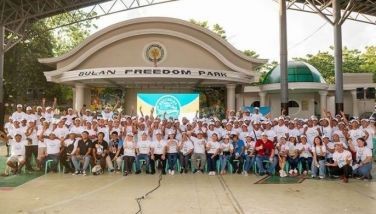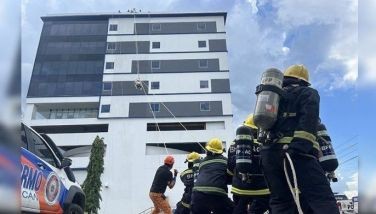If Ebdane will stay, then name names

July 18, 2003 | 12:00am
The verdict is almost unanimous in both Houses of Congress: the PNP chief no less must resign because of the apparent police connivance in the escape of convicted terrorist Fathur Rohman al-Ghozi from Camp Crame. But Dir. Gen. Hermogenes Ebdane is adamant: "I cannot (resign) just because somebody said so. I will be running away from the problem."
The problem, as he assesses it, is not just "human factor" of sentries being bribed to look the other way as a maximum-security prisoner walks out of his cell. Ebdane hints that the caper is the handiwork of high officers who not only want him out but also want his job.
That charge is serious. Ebdane must substantiate it.
Officers who would want his job can only be generals or full colonels – ranks that qualify them for the top PNP post. There are 175 of them in the 115,000-strong PNP. Still, it can only be high treason for such an ambitious officer to let loose a confessed killer-bomber on civilians just so, on the slim chance, he can rise to the top. Ebdane has the duty to warn the public who the officer is. He must name names.
The repercussions of al-Ghozi’s escape have unfolded. Businessmen foresee another drop in trade and investments just when the economy is beginning to pick up from four years of doldrums. Tourism too will dip, for who would visit a country where no one trusts the police. The PNP’s image is at its lowest. Countries in the coalition against global terrorism are now thinking twice about Philippine participation. Australian Prime Minister John Howard was in town when al-Ghozi sashayed out of the top-security PNP-Intelligence Group compound with two Abu Sayyaf kidnappers. While the PNP brass nervously were planning how to break the news to President Gloria Arroyo, she and Howard were witnessing the signing of an accord against terrorism by Interior Secretary Jose Lina and Australian Federal Police Commissioner Mick Keelty, and a bilateral cooperation pact against transnational crime by Foreign Secretary Blas Ople and Australian counterpart Alexander Downer. The agreements called for A$5-million aid to Manila. Now the Sydney Morning Herald is saying that "as long as the security forces and the bureaucracy of the Philippines ... remain vulnerable to corruption, no amount of aid for specialist police training can guarantee the anti-terrorist effort." Washington, too, is outraged at the ease with which al-Ghozi got out. The White House is reconsidering if US President George W. Bush should visit Manila in October. Singapore, meanwhile, is warning Southeast Asia to brace for more terrorist bombings.
All these illustrate the extent of the damage al-Ghozi’s flight inflicted on world security, not to mention the Philippine image. Ebdane cannot just say somebody wants his job and thus let al-Ghozi free. It’s his obligation to nail that somebody.
Unless, of course, he’s only seeing ghosts.
Days before Ebdane was to assume the top PNP post on July 4, 2002, notorious kidnappers Faisal Marohombsar, Rolando Patiño and Abdul Macaombang escaped from the jail of his National Anti-Kidnapping Task Force in Camp Crame. Like today, he was quick to mumble that it was the handiwork of officers who did not want him to become PNP chief.
What did he do to the Naktaf guards who were supposed to check on the detainees every hour on the hour? Did he file a criminal charge of infidelity in the custody of prisoners which can fetch a jail term, or an administrative charge of gross negligence which can spell dismissal from the service? More important, did he pursue his lead to smoke out the plotting officers? The escaped trio were as dangerous to society as al-Ghozi and his Abu Sayyaf cohorts. If the police story is to be believed, Marohombsar’s gang had just kidnapped a teenager when a posse cornered and killed him in Cavite months later. Patiño was a suspect as well in the New Year’s eve 2001 killing of intelligence analyst Capt. Baron Cervantes.
There has been no news since about the supposed plotting traitors.
Al-Ghozi et al. are not the only ones to disappear from the PNP-IG. Supt. Glenn Dumlao, the suspect-turned-state witness in the Nov. 2000 kidnap-murder of prominent publicist Bubby Dacer, also went missing last May. New witnesses have implicated him in the Kuratong Baleleng massacre of May 1995. To this day Ebdane refuses to publicly acknowledge the disappearance. But when confronted about it by higher-ups, he reportedly said it’s because the PNP-IG commanders are not his men but loyalists of a predecessor. Has the PNP sunk that low?
What’s this? Justice Undersecretary Merceditas Gutierrez reportedly ordered state prosecutors last Wednesday to not pursue the case against 38 Chinese poachers arrested last September in Malampaya, off Palawan. The intruders allegedly entered a plea bargain and were released yesterday on light fines. Environmentalist lawyers were not allowed to prosecute. The Navy men who apprehended the poachers are downhearted, wondering why they have to make arrests when civilian authorities are not keen on enforcing the law, anyway. All in the name of goodwill gestures to China.
Come to think of it, al-Ghozi didn’t need to escape from Camp Crame, and now risk Ebdane’s shoot-to-kill order to the police and the public. He could have waited just a little more time and the justice department would have let him go with a plea bargain – as an act of goodwill perhaps to the Moro Islamic Liberation Front.
Catch Sapol ni Jarius Bondoc, Saturday, 8 a.m., on DWIZ (882-AM).
E-mail: jariusbondoc@workmail.com
The problem, as he assesses it, is not just "human factor" of sentries being bribed to look the other way as a maximum-security prisoner walks out of his cell. Ebdane hints that the caper is the handiwork of high officers who not only want him out but also want his job.
That charge is serious. Ebdane must substantiate it.
Officers who would want his job can only be generals or full colonels – ranks that qualify them for the top PNP post. There are 175 of them in the 115,000-strong PNP. Still, it can only be high treason for such an ambitious officer to let loose a confessed killer-bomber on civilians just so, on the slim chance, he can rise to the top. Ebdane has the duty to warn the public who the officer is. He must name names.
The repercussions of al-Ghozi’s escape have unfolded. Businessmen foresee another drop in trade and investments just when the economy is beginning to pick up from four years of doldrums. Tourism too will dip, for who would visit a country where no one trusts the police. The PNP’s image is at its lowest. Countries in the coalition against global terrorism are now thinking twice about Philippine participation. Australian Prime Minister John Howard was in town when al-Ghozi sashayed out of the top-security PNP-Intelligence Group compound with two Abu Sayyaf kidnappers. While the PNP brass nervously were planning how to break the news to President Gloria Arroyo, she and Howard were witnessing the signing of an accord against terrorism by Interior Secretary Jose Lina and Australian Federal Police Commissioner Mick Keelty, and a bilateral cooperation pact against transnational crime by Foreign Secretary Blas Ople and Australian counterpart Alexander Downer. The agreements called for A$5-million aid to Manila. Now the Sydney Morning Herald is saying that "as long as the security forces and the bureaucracy of the Philippines ... remain vulnerable to corruption, no amount of aid for specialist police training can guarantee the anti-terrorist effort." Washington, too, is outraged at the ease with which al-Ghozi got out. The White House is reconsidering if US President George W. Bush should visit Manila in October. Singapore, meanwhile, is warning Southeast Asia to brace for more terrorist bombings.
All these illustrate the extent of the damage al-Ghozi’s flight inflicted on world security, not to mention the Philippine image. Ebdane cannot just say somebody wants his job and thus let al-Ghozi free. It’s his obligation to nail that somebody.
Unless, of course, he’s only seeing ghosts.
Days before Ebdane was to assume the top PNP post on July 4, 2002, notorious kidnappers Faisal Marohombsar, Rolando Patiño and Abdul Macaombang escaped from the jail of his National Anti-Kidnapping Task Force in Camp Crame. Like today, he was quick to mumble that it was the handiwork of officers who did not want him to become PNP chief.
What did he do to the Naktaf guards who were supposed to check on the detainees every hour on the hour? Did he file a criminal charge of infidelity in the custody of prisoners which can fetch a jail term, or an administrative charge of gross negligence which can spell dismissal from the service? More important, did he pursue his lead to smoke out the plotting officers? The escaped trio were as dangerous to society as al-Ghozi and his Abu Sayyaf cohorts. If the police story is to be believed, Marohombsar’s gang had just kidnapped a teenager when a posse cornered and killed him in Cavite months later. Patiño was a suspect as well in the New Year’s eve 2001 killing of intelligence analyst Capt. Baron Cervantes.
There has been no news since about the supposed plotting traitors.
Al-Ghozi et al. are not the only ones to disappear from the PNP-IG. Supt. Glenn Dumlao, the suspect-turned-state witness in the Nov. 2000 kidnap-murder of prominent publicist Bubby Dacer, also went missing last May. New witnesses have implicated him in the Kuratong Baleleng massacre of May 1995. To this day Ebdane refuses to publicly acknowledge the disappearance. But when confronted about it by higher-ups, he reportedly said it’s because the PNP-IG commanders are not his men but loyalists of a predecessor. Has the PNP sunk that low?
Come to think of it, al-Ghozi didn’t need to escape from Camp Crame, and now risk Ebdane’s shoot-to-kill order to the police and the public. He could have waited just a little more time and the justice department would have let him go with a plea bargain – as an act of goodwill perhaps to the Moro Islamic Liberation Front.
BrandSpace Articles
<
>
- Latest
- Trending
Trending
Latest
Trending
Latest

By COMMONSENSE | By Marichu A. Villanueva | 45 minutes ago

By GO NEGOSYO PILIPINAS ANGAT LAHAT! | By Joey Concepcion | 2 days ago
Recommended

June 16, 2025 - 12:04pm

























